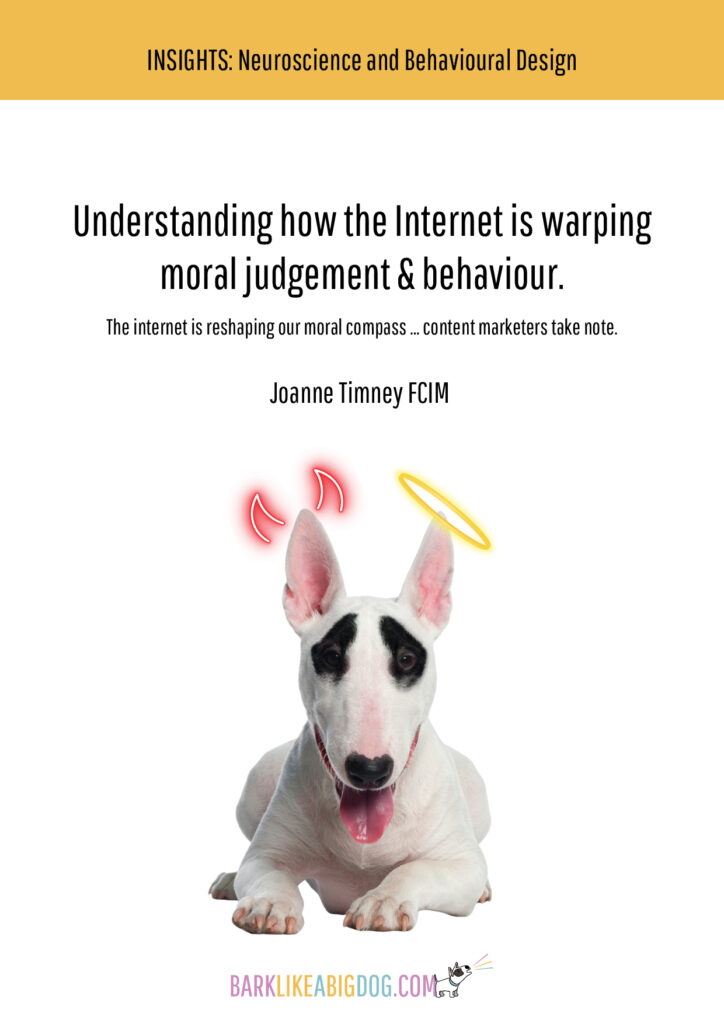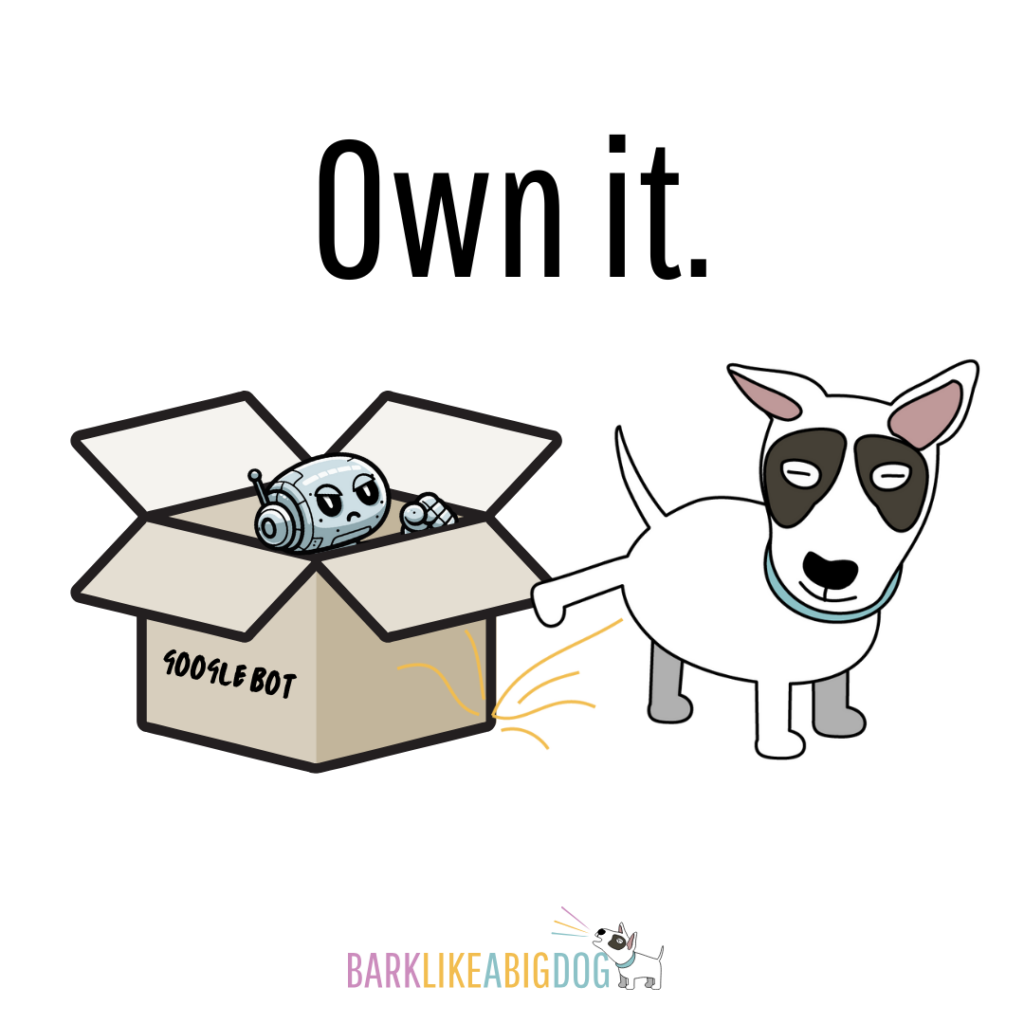Free Resources
Featured Article
BREAKING: New York University Study explores how the Internet warps human morality.

The internet is reshaping our moral compass ... content marketers take note.
Understanding how the new normal for moral judgement and behaviour will affect your business content.
A fascinating new study undertaken by New York University1 sought to identify how access to the internet is affecting our moral compass. Our ability to judge (and be judged) has developed over the millennia. Our tendency to care about issues like fairness, reciprocity, and empathy evolved to enhance the functioning of small, close-knit societies where individuals directly depended on their social ties for survival.
Fast forward to today, where we’re existing in an environment that is undergoing a transformation potentially more significant than the agricultural revolution 12,000 years ago. It's estimated that over 5 billion people, accounting for more than 60% of the global population, use the internet regularly. This percentage is even higher in developed countries, reaching up to 99%, making internet use nearly universal in some cultures.
So, how is all that access, content and a shift in the social landscape affecting our behaviour … and why should it matter to marketers?
The bottom line is our brains are lagging behind (we’re all still sweaty cave dwellers at heart) technology and the internet is having a very real impact on our fundamental moral instincts. The study explains how people’s evolved moral psychology is easily exploited by algorithms, endless newsfeeds, and sensational content. The transition to the online environment has fundamentally altered the social landscape, and behaviours that were advantageous in small groups often prove ineffective online. Evolved responses to moral conflict, such as compassion for victims and punishment for transgressors, produce different outcomes online compared to those of small groups.
The study identified two key features of the online context that disrupt the socially functional outcomes of compassion and punishment. First, the internet's scale exposes individuals to an unnaturally large amount of extreme moral content. This exposure results in dysfunctional outcomes like compassion fatigue and increased public shaming. Second, the physical and psychological distance between moral actors online creates a mismatch in people's reactions to moral transgressions. This increased distance alters the dynamics of punishment from their evolutionary optimal state, leading to ineffective collective action and virtue signalling. These mismatches contribute to rising negativity, outrage, and intergroup conflict online.
Not every business faces online conflict, but we, as humans are facing it every day in our social digital experiences. I’ve taken the core findings of the study and highlighted some ways to overcome (or at least be aware of the potential dangers) for professional service marketers, and particularly those operating in ‘Your Money or Your Life’ (YMYL) sectors such as health, finance, medicine, and current affairs. But there are some lessons that should resonate with all content marketers, if for no other reason than to take a fresh look at the environment into which you are dropping your messages.
Address Compassion Fatigue with Mindful Content Curation:
Insight: The study highlights that constant exposure to distressing content online leads to compassion fatigue. Marketers should be mindful of not overwhelming their audience with too much emotionally taxing information.
Application: Balance messaging by mixing emotionally charged content with positive, uplifting stories. Use content moderation to avoid overloading the audience’s empathy.
Promote Authentic Engagement Over Virtue Signalling:
Insight: The internet facilitates cost-free punishment and virtue signalling, which can lead to shallow interactions. Authenticity is crucial in building trust and meaningful connections.
Application: Encourage genuine interactions and feedback from your audience. Avoid campaigns that solely rely on trending topics for visibility and instead focus on long-term engagement strategies.
Foster Constructive Public Discourse:
Insight: Public shaming is rampant due to the ease of dispensing punishment online. Marketing messages should aim to foster a constructive and respectful community.
Application: Promote respectful dialogue and handle conflicts or negative feedback with empathy and constructive responses. Establish clear community guidelines to maintain a positive environment.
Design for Sustainable Engagement:
Insight: The study calls for research into platform design that mitigates negative impacts. Sustainable engagement is key to maintaining audience interest without inducing negative externalities.
Application: Until such time as the tech is there to support it, create content that sustains long-term engagement through interactive and educational formats. Use gamification, rewards, and other strategies to keep the audience engaged without overwhelming them.
Increase Transparency in Content Algorithms:
Insight: There is a need for greater transparency of platform algorithms to understand their impact on user behaviour. Transparency can build trust and improve user experience.
Application: Be transparent about how content is curated and promoted. Educate your audience about how their interactions influence what they see and involve them in content creation to enhance trust and loyalty.
Encourage Real-World Actions Over Digital Gestures:
Insight: Non-costly forms of compassion, like “liking” or “sharing” posts, often replace real aid. Encouraging tangible actions can lead to more effective outcomes. Campaign death if you are in the charitable donation game.
Application: Design campaigns that encourage real-world actions, such as volunteering, donating, or participating in local events. Highlight the impact of these actions to motivate your audience.
Adapt to the Scale and Diversity of the Online Audience:
Insight: The internet exposes users to a vast amount of extreme moral content, affecting their moral responses. Recognizing the diversity and scale of the online audience is essential.
Application: Tailor your marketing messages to address different segments of your audience, considering their unique experiences and perspectives. Use data-driven insights to personalize content and make it more relevant.
Conclusion:
Creating content in a vacuum or ignoring the impact the internet is having on general human behaviour, is courting disaster for any marketer. As more research explores the very real impact (and unnatural pace of change) of the Internet on us poor, bombarded humans, the more cognisant we need to be of the wider messaging environment. Don’t fall into a trap of letting your prospects or referral sources off with just a simple like and don’t ever assume your messaging is affected by the wider web. Your goal should be to create more effective, empathetic, and sustainable engagement with your audience, fostering a healthier online environment.
References:
1. Original Study: Morality in the Anthropocene: The perversion of compassion and punishment in the online world. Authors: Claire E. Robertson, Azim Shariff and Jay J. Van Bavel. New York University, June 2024.
Featured Article Printable PDFs
Case Studies & Papers


Neuromarketing Blog Posts

Trust-Based Search Rankings & Neuromarketing: The SEO Edge You Need
If Google Doesn’t Trust You, You Won’t Exist—How Neuromarketing Gets You Seen Trust-based search rankings and neuromarketing; say what now? Let’s start with a reality check—your brain is making decisions before you even realise it. Think you’re in control? Think

How to create an Ai-proof content Strategy.
How to own the Ai search landscape. I’ts time to create an Ai-proof content strategy! The impact of AI search on credential sites can’t be overstated. Artificial Intelligence (AI) is reshaping how potential clients discover and evaluate professional services firms.

The Impact of AI Search on Credential Sites.
Why Professional Services Firms Need to Act Now. The impact of AI search on credential sites can’t be overstated. Artificial Intelligence (AI) is reshaping how potential clients discover and evaluate professional services firms. With AI-driven search engines like Google’s AI


